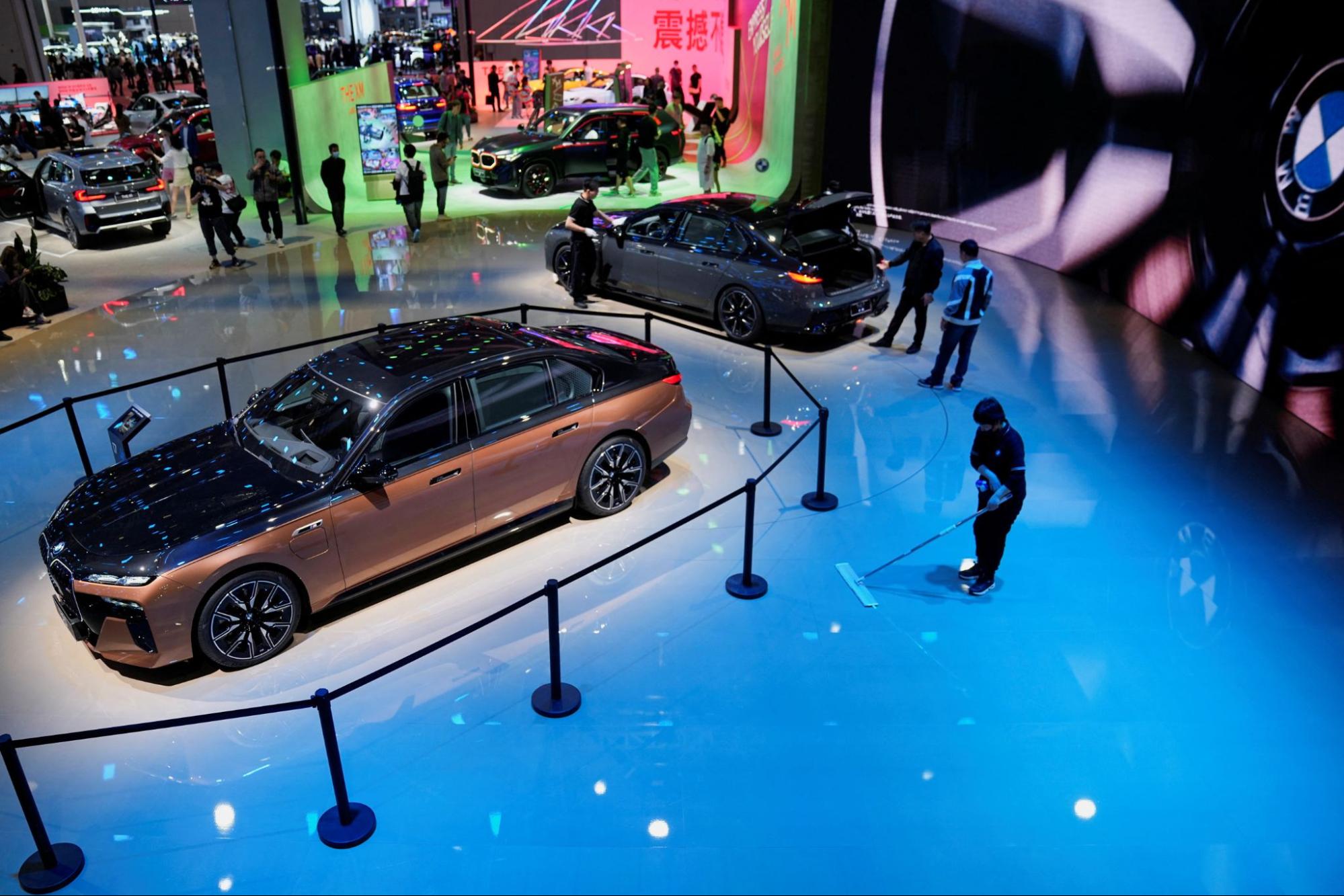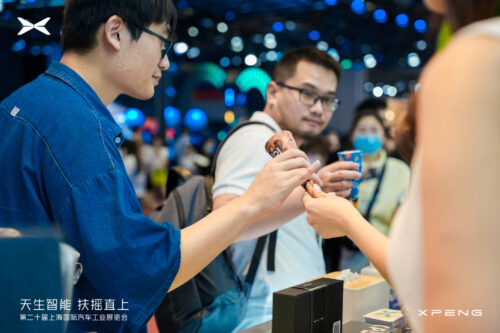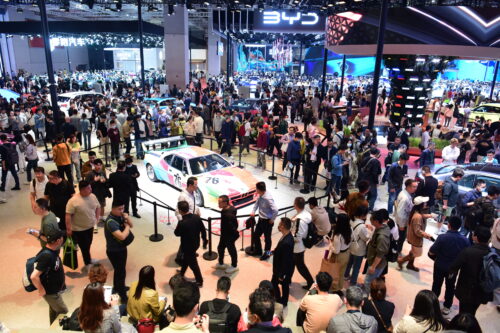BMW melts down over ice cream scandal at Shanghai auto show
BMW, which has huge ambitions for the China market, has had to deal with a PR nightmare at the Shanghai auto show this week. The reason? A botched ice cream giveaway.

German car giant BMW has issued a mea culpa and promised to improve staff training after accusations of anti-Chinese discrimination at the Shanghai auto show. Two staffers at the company’s Mini booth, who were Chinese, allegedly denied a Chinese visitor free ice cream, then gave the frozen treat to a foreigner.
The controversy erupted on Chinese social media on Thursday after a viral video emerged from the event. The clip starts out with a local visitor speaking to two BMW workers at the booth, only to be told that there was no ice cream left. A few minutes later, when a foreigner approaches the stand, he’s greeted with enthusiasm and walks away with a cup.
Confused over the different treatment, the unknown creator of the video then films himself inquiring about the treats. After being told that the freebies have run out, the person asks to see the inside of the portable freezer, but his request is denied by the BMW staff, who later removes the ice cream stand entirely. The video ends with a shot of a group of people savoring their ice cream at the show, all of whom appear to be non-Chinese.
The clip gained immediate traction on Weibo yesterday, leading to many people accusing the German carmaker of discriminating against Chinese customers. As of Thursday afternoon, a bevy of hashtags related to the scandal have collectively garnered more than 1 billion views.
“Is this the 2023 version of ‘Chinese and dogs are not allowed’? If I were there, I would have completely lost my temper,” a Weibo user fumed. Another person wrote, “As a BMW owner, I’m hurt and embarrassed.”
On Thursday afternoon, the PR crisis for BMW escalated when a content creator on Douyin, the Chinese sibling of TikTok, livestreamed herself staging a protest at the BMW booth and being escorted out of the venue by security staff.

A person described as “familiar with the matter” by Reuters told the news outlet that the BMW booth “had finished giving out 300 servings of ice cream meant for visitors when the incident occurred, and the foreigner in the video was a BMW employee.” The unidentified person also claimed that the two women working at the stand were “temporary workers hired locally for the show, not BMW staff.”
Meanwhile, a slew of car bloggers and automotive brands joined the fray. In a video uploaded to Weibo yesterday, an internet personality focusing on reviewing vehicles is seen distributing free ice creams at the motor show. Throwing salt on the wound, Chinese electric vehicle makers Guangzhou Xiaopeng Motors and Guangzhou Automobile Corporation set up their own ice cream stands at the event on Thursday. On Douyin, a Chinese employee at an Audi showroom advertised a special ice cream promotion at his location. “These ice creams are only for Chinese,” he wrote in the caption.
Under mounting pressure, BMW’s Mini China Weibo account posted a statement on Thursday afternoon, saying that the company was “sincerely sorry” about the “discontent” caused by its “sloppy internal management and staff’s failure of duty.”
The ice cream promotion was designed to “offer a sweet dessert to adults and kids visiting the show,” it wrote. “We will conduct self-reflection and improve staff training. We will strive to provide better service and experience for our customers.”
China news, weekly.
Sign up for The China Project’s weekly newsletter, our free roundup of the most important China stories.
Hoping to insulate itself from the public furor, Luneurs, the manufacturer of the ice cream at the BMW booth, also released a statement on Thursday, stressing that it played no part in the controversy. “As a Shanghai-based ice cream and pastry brand, we are always grateful for every customer,” it wrote. “Customer experience, social responsibility, and the idea that all patrons are equal are very important to us.”
Held biannually, the Shanghai auto show is one of the industry’s largest and most comprehensive exhibitions around the world. The 2023 edition of the fair, which opened on April 18 and will run through April 27, is the first of its size in China since 2019 and features more than 1,000 automakers and parts manufacturers.
For international carmakers like BMW, the exhibition provides a key opportunity to showcase their latest products in an increasingly competitive and evolving market, where domestic automakers are now selling more cars than their global rivals, which have struggled to keep up with Chinese consumers’ demand in fast-growing areas like electric vehicles and SUVs.
The Mini brand, which BMW owns and operates, sold 28,700 cars in China last year, accounting for 3.6 percent of BMW’s total annual sales in the world’s biggest automotive market. Later this year, the brand, in collaboration with the biggest Chinese SUV manufacturer, Great Wall Motor, is expected to unveil electric versions of its Mini vehicles.
While giving a presentation earlier this week at the Shanghai auto show, BMW’s Chief Executive Oliver Zipse talked up the importance of Chinese consumers and said that it expected slight growth in sales for its Chinese market this year. “What works in China, works all over the world,” he said. “China is the place to be. BMW is at home in China.”
The ice cream meltdown, however, has put the German automaker’s China commitment under scrutiny. Despite its apology, the outrage on Chinese social media continued to build over the course of Thursday, with a growing number of commenters calling for a boycott of the brand. “Actions speak louder than words. BMW clearly has no respect for Chinese people,” a Weibo user wrote.
The German car giant isn’t the first overseas automobile brand to catch flak. Other global companies that have found themselves in a similar situation have managed to emerge from the scandals largely unscathed. For instance, in 2017, German luxury automotive brand Audi had to issue an apology for airing a sexist commercial in China in which a bride is compared to a used car and is inspected by her future mother-in-law for her flaws. A year later, Mercedes-Benz was slammed by Chinese consumers for an Instagram post that featured a quote from exiled Tibetan spiritual leader Dalai Lama, who Beijing considers a dangerous separatist. While the controversies caused temporary damage to Audi and Mercedes-Benz’s reputation in China, they suffered no long-term consequences.

